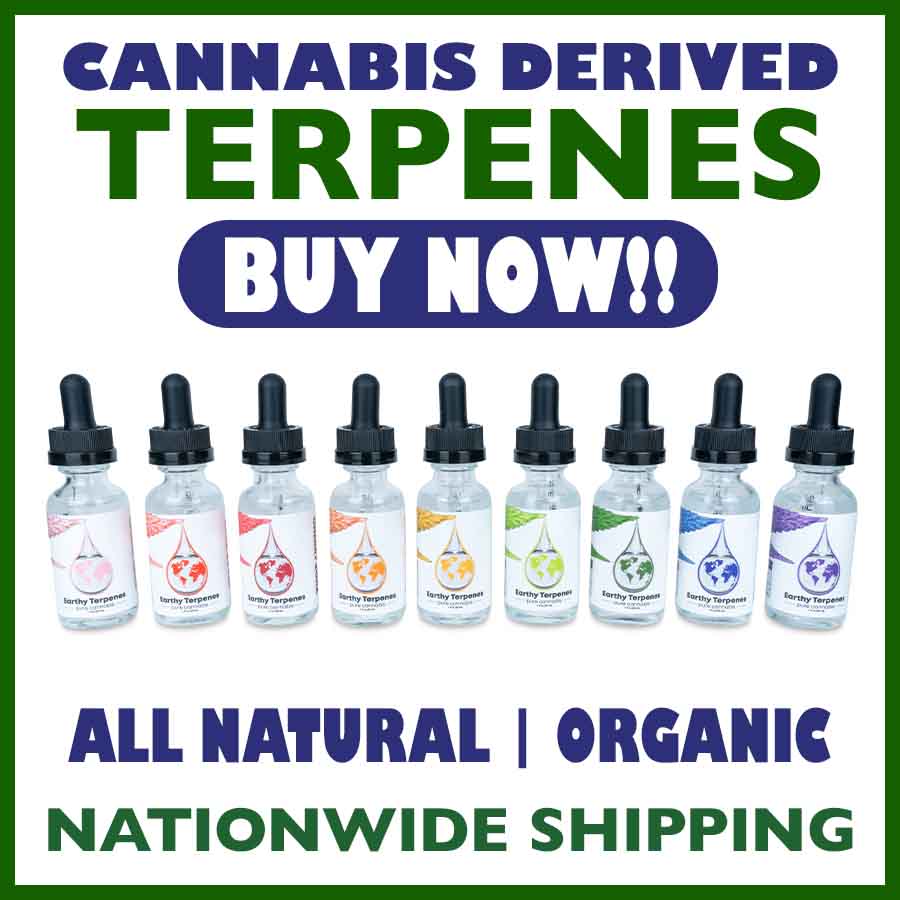The bergamot orange is too bitter to eat on its own, but when its oil is added to black tea leaves—magic happens. Suddenly, you’ve got Earl Grey!
One of the qualities that makes bergamot so bitter and yet so beguiling is the terpene p-cymene. A powerful flavoring agent and one of the building blocks of many commercial fragrance preparations, p-cymene evokes bursts of allspice, fresh wood, and citrus.
Like with bergamot oil, p-cymene happens to be so intense by itself that it is often used as a supplementary scent to amplify other, more subtle scents of natural product. But it’s not the smell and taste alone that make the chemistry of this molecule so intriguing.
Here we’ll explore the highlights physical properties and molecular structure of this curious terpene compound and explain how it can enhance your experience of various cannabis strains and other products.
What are terpenes?
In essence, terpenes are molecules responsible for determining a plant’s smell. Additionally, they serve the plant by giving off scents that protect it from predators and help it attract pollinators. Particularly repellent smells, for instance, might act as insect repellents, thereby keeping a plant safe from being eaten. On the other hand, terpenes play a vital role in their production by luring helpful insects to flowers to ensure the plant’s survival through pollination [1].
When you smell a flower or open a bottle of essential oil, you’re inhaling the various aromatic compounds and natural compounds of the plant into your olfactory neurons. In other words, you’re smelling terpenes. Likewise, the chemical terpene profiles different concentrations of various cannabis strains determine their distinctive smells and tastes.
Additionally, terpenes have been identified with the potential to offer benefits that alter the overall experience of the cannabis plant as terpenes are observed to work alongside cannabinoids to amplify the effects [2].
Taste the terps in Earthy’s CBD Pre-Rolls
What is p-cymene?
P-cymene is one of the lesser-known terpenes, yet you’ll find it in myriad natural substances, chemical products, flavoring agents, fragrances, foods and beverages. Its chemical structure includes one benzene ring with one methyl group and one isopropyl group attached. With three isomers (p-cymene, m-cymene, and o-cymene) cymene has a molecular weight of 134.21 and a density of 857kg/m3, which makes it lighter than water [3].
Naturally present in the essential oils of thyme, oregano, bergamot, and other plants, cymene has a pleasant odor described as citrus, woody, sweet and earthy but can be toxic and jarringly harsh in bulk quantities. For this reason and other factors, cymene is used in small amounts in the perfume and cleaning product industries.
Safety and handling of p-cymene
Though p-cymene is a useful ingredient for many products, it is important to use precautionary measures when using high concentrations of it as it is part of a group of volatile organic compounds. When it is oxidized, benzoic acid is one of the dry chemical compounds produced. Additionally, flammable liquids may be formed when p-cymene is oxidized, an outcome that requires the use of non-sparking tools, a well-ventilated area, a tightly closed container, and plenty of fresh air.
If a fire is sparked by the flammable liquid, use alcohol-resistant foam to quell it. P-cymene has been among hazardous chemicals known from previous studies to be dangerous to aquatic life, so excesses of the terpenes should be disposed of at an approved waste disposal or treatment plant using only non-sparking tools [4].
Uses for p-cymene
P-cymene is a popular ingredient for the production of numerous commercial products:
- cleaning compounds
- cough medicines
- pesticides
- fungicides
- perfumes
- soaps and cosmetics
- foods [5]
Effects of p-cymene
In trace concentrations, p-cymene may have a calming effect as in aromatherapy. Similarly, a full-spectrum cannabis product with p-cymene can have a soothing smell as well as enhance the effects of the cannabinoids present in the strain. This process is known as the entourage effect [2]. Other potential benefits of p-cymene are currently being researched, yet precautionary statements about its efficacy abound.
Cannabis strains high in p-cymene
P-cymene is one of the top 20 terpenes in cannabis. Cannabis strains with significant concentrations of p-cymene include:
- Sour Lifter – A diploid, Sativa-dominant hybrid strain from Oregon CBD, Sour Lifter comes from crossing SH 50 (Special Sauce x New World Haze) and their GG#4 Conversion. The products of this pairing present a sweet, up-front pungency and full sour diesel finish.
- Sour Special Sauce – An Indica-dominant strain from Oregon CBD, Sour Special Sauce is the result of pairing Special Sauce with GG#4 Conversion. The strain is woody and fruity, spicy and sour, with astringent, exotic berries, and notes of sour, dank earth.
- Lifter – A pioneering and award-winning Sativa-dominant strain from Oregon CBD, Lifter comes from crossing SH 50 (Special Sauce x New World Haze) and Early Resin Berry (ERB). The combination of terpenes from these parents creates a gassy, funky, sweet mix that hits the palate with just the right balance of bitterness.

What is the entourage effect?
Regarding the effects of p-cymene and other terpenes, there is some evidence to indicate that they may play a powerful role in the endocannabinoid system (ECS) by influencing the entourage effect. The entourage effect was first coined by Mechoulam and Ben-Shabat in their 1998 hypothesis that other organic compounds work in combination with the primary endogenous cannabinoids in cannabis to create a synergistic effect. This may indicate that terpenes taken with other cannabis compounds such as THC or CBD may affect the body differently than terpene isolates or cannabis products that are not full-spectrum [2].
Sources of p-cymene
Other compounds than cannabis, some other sources of p-cymene include:
- cumin
- oregano
- thyme
- cilantro
- coriander
- eucalyptus
- bergamot
- citrus [6]
Final thoughts on p-cymene
Some things in life just need a little enhancement to make the experience extra special. Remember the earlier example of plain old black tea combined with bergamot oil? P-cymene can be the boost that a given fragrance needs to fully ignite your senses. When it comes to cannabis aromas, p-cymene is one of the terpenes that can make your self-care moment next level.
Medical Disclaimer / Legal Disclaimer – Information is provided for educational purposes. It does not and is not intended to constitute legal advice or medical advice. We attempt to be accurate and up to date, but the legality of cannabinoids and the science of cannabis are evolving. The author is neither a legal professional nor a medical expert. Before buying or using any products, you should check with your local authorities and medical providers.





